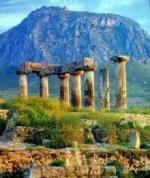"He Must Reign" -- 1 Corinthians 15:20-28
 Monday, August 12, 2013 at 10:12AM
Monday, August 12, 2013 at 10:12AM  The Thirtieth in a Series of Sermons on 1 Corinthians
The Thirtieth in a Series of Sermons on 1 Corinthians
Paul has made his case that the Christian faith stands or falls based upon whether or not Jesus Christ has been raised from the dead. Paul has told the Corinthians that the gospel he preached to them, which they accepted as true, is grounded in the facts of Jesus Christ’s death, burial, and resurrection according to the Scriptures. If Jesus Christ was bodily raised from the dead, then Christianity is true, and so is the gospel the Corinthians accepted. But if Jesus did not rise again from the dead, then Christianity is false and the Corinthians have believed that gospel in vain, because a dead savior cannot save anyone if he can’t even save himself. Having affirmed that Jesus Christ did rise again from the dead, Paul now addresses the relationship between Jesus Christ’s own death and resurrection, and our bodily resurrection at the end of the age. And this brings us to Paul’s discussion of the second coming of Jesus Christ, the resurrection of the dead at the end of the age, and the course of redemptive history in between.
We are nearing the end of our study of Paul’s first letter to the Corinthian church, as we make our way though 1 Corinthians 15, one of the most important chapters in all the Bible. We have covered Paul’s discussion of the gospel in verses 1-11, as well as Paul’s treatment of the fact of the resurrection in verses 12-19. And then in verses 29-34, we saw that for Paul, the resurrection is the basis for Christian ethics because the resurrection not only establishes the truth of Christianity, it gives meaning and purpose to everything we do. Unlike the pagans, who see death as that moment when the soul is finally liberated from the body (and its bodily urges), Christians anticipate the resurrection of our bodies, when God rejoins body and soul which have been torn apart by death. It is here that we find our hope for the future. Not having such hope, pagans can only live for the moment–“eat and drink for tomorrow we die.”
Christians, however, look ahead to that glorious day when Jesus Christ returns to judge the world, raise the dead and to make all things new. We live our daily lives in light of that great event yet to come. This gives everything we do meaning and purpose. So, in this sermon we turn our attention to verses 20-28 of 1 Corinthians 15, where Paul briefly maps out the course of the future period of time between Christ’s own resurrection that first Easter and the last day, when Jesus returns, and all those who have died in Christ are raised from the dead.
Although Bible prophecy devotees run wild with all kinds of speculation about the Rapture, the antichrist, the Battle of Armageddon, and a future millennial kingdom in which lions lie down with lambs and where Jesus rules the world from the city of Jerusalem, when Paul maps out the course of the future, none of these things are mentioned. For Paul, our hope is grounded in Jesus Christ’s resurrection from the dead, which is the first-fruits of the great harvest yet to come, the general resurrection at the end of the age, when Jesus Christ returns and all of human history comes to its final climax.
To read the rest of this sermon: Click Here


Reader Comments